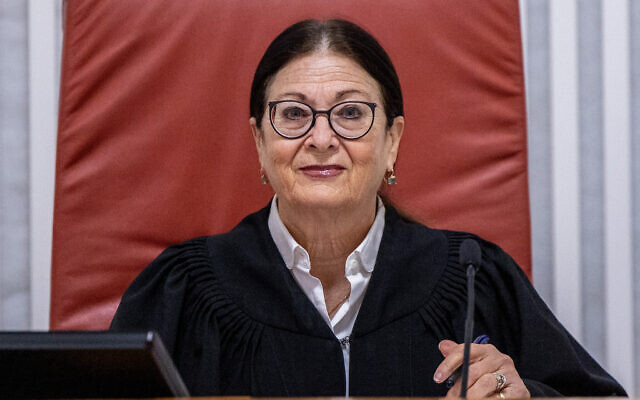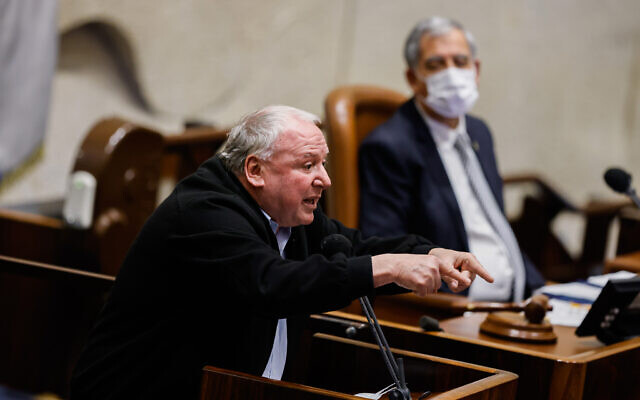An MK from the far-right Otzma Yehudit party submitted a bill on Sunday that would transform the Judicial Selection Committee, recalibrating the balance between the judiciary and legislature by putting ultimate power over the appointment of Israel’s judges in the hands of politicians.
By current law, the nine-member committee is composed of four politicians, two representatives of the Israel Bar Association chosen by the Bar, and three Supreme Court justices. The bill, part of a series of radical judicial reforms planned by the presumed incoming government, would nix the Bar appointees in favor of two lawyers recommended by the justice minister and approved by the government.
In lieu of a constitution, judicial appointments are governed by the quasi-constitutional Basic Law: The Judiciary. Critics and legal scholars have warned that moves by right-wing parties to curb the judiciary could disrupt the system of checks and balances between Israel’s branches of government.
The explanation accompanying Yitzhak Wasserlauf’s bill states that it is meant to correct what it called the “moral distortion” of giving unelected Bar Association members a say in the appointment of judges.
Instead, the proposed update would transfer that power from the Bar’s national council to the justice minister, a position that is expected to be filled in the next government by a member of presumed incoming prime minister Benjamin Netanyahu’s Likud.
Get The Times of Israel's Daily Edition by email and never miss our top stories
Likud and its far-right partners Otzma Yehudit and Religious Zionism have attacked the Judicial Selection Committee — which also appoints Supreme Court justices — and have pushed for more radical changes to it.

Supreme Court Chief Justice Esther Hayut attends a hearing in Jerusalem on December 1, 2022. (Yonatan Sindel/Flash90)
In its own sweeping judicial reform platform released in October, Religious Zionism said it would remake the panel’s profile to comprise 10 members instead of the current nine: seven politicians and three judges, two of whom would be selected by the justice minister. The justice minister would chair the panel, which would include the Supreme Court president as its only fully non-political appointment.
Of the six lawmakers sitting on the panel, four would be from the coalition and two from the opposition. With the justice minister as the seventh, the committee would consist of five coalition politicians, two opposition lawmakers, two government-selected judges, and the Supreme Court president, giving a clear majority to government politicians and government-selected representatives.
Under current law, seven out of nine panel members are needed to reach a majority. Religious Zionism did not specify what would constitute a majority in its proposed 10-member committee.
In its platform, Religious Zionism also proposed gutting the Israel Bar Association by transferring its licensing power to the Justice Ministry and making the Bar a voluntary organization concerned with lawyers’ welfare.
Likud in June introduced its own version of a bill to put judicial appointments under politicians’ thumb. Led by lawmaker David Amsalem — who has pushed himself as an unlikely candidate for justice minister — the bill would scrap the panel entirely and appoint justices on recommendation of the government, with Knesset approval.

MK David Amsalem speaks during a plenum session at the Knesset in Jerusalem on February 7, 2022. (Olivier Fitoussi/Flash90)
A similar proposal was pushed by outgoing Interior Minister Ayelet Shaked when she was justice minister, whereby the justice minister would appoint candidates to be confirmed by the Knesset. Shaked’s Jewish Home party failed to win seats in the November 1 election and she said she plans to exit politics once the new government replaces her.
A political neophyte, Wasserlauf is expected to be Israel’s youngest minister once the government is confirmed. According to a coalition deal signed between Likud and Otzma Yehudit, Wasserlauf — second in the party to chief Itamar Ben Gvir — is expected to be minister in charge of development of the Negev and the Galilee.
Before entering political life, lawyer Ben Gvir defended Jewish radicals in Israeli courts and was himself convicted of supporting a Jewish terror group and inciting racism. He first clashed with the Israel Bar Association when it tried to block his licensing exams on account of pending criminal charges, of which Ben Gvir was later acquitted.
Shortly before the November election, Ben Gvir said he would support a bill to cancel Netanyahu’s ongoing corruption trial.


